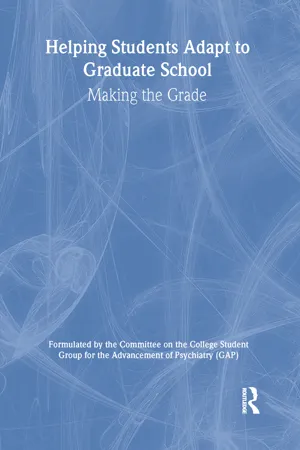
- 132 pages
- English
- ePUB (mobile friendly)
- Available on iOS & Android
About This Book
Help graduate students cope with the pressures of school, finances, family, and professors!
In order to succeed in school:
- The college undergraduate just has to be able to find and operate an elevator in the campus high-rise
- The master's degree student has to climb the side of the building
- The PhD student doing research with a professor has to jump over the building in a single bound, carrying the professor
That bit of grim humor contains a bitter kernel of truth. Helping Students Adapt to Graduate School is the first book that focuses on the unique problems of graduate students and the best ways to counsel and support them.
Graduate and professional schools are draining - emotionally, financially, and physically. In addition to coping with the pressures of classes and high performance expectations, many graduate students juggle multiple lives, trying to please their professors, maintain their status as adults, pay for books and classes and rent and food, keep up a place to live, preserve their marriages, raise their children, and deal with their parents, all while they work as teaching assistants, resident advisors, or research assistants. When adults return to school, they may find themselves forced into a childlike status, causing considerable resentment or regression and sometimes reawakening old conflicts. Furthermore, the relationship of professors and graduate students is often complex and emotionally enmeshed, tinged with issues of respect, rivalry, and even romance. Not surprisingly, many graduate students find the conflicts overwhelming at times.
With fascinating case studies and lucid explanations, Helping Students Adapt to Graduate School offers a clear look at the special difficulties of graduate students and practical ways the university can help, including:
- fostering a sense of belonging
- providing year-round mental health services
- helping students handle financial pressures and career decisions
- supporting the unique needs of minority, international, married, and older students
- understanding the hidden subtext of faculty-student relationships
- encouraging a balance of family and school
Helping Students Adapt to Graduate School is an essential resource for deans, administrators, professors, and counselors working with graduate students. By illuminating the complex interplay between the university environment and the inner psychological life of graduate students, it will help you provide supportive services to the students in your campus community.
Frequently asked questions
Information
CHARACTERISTICS OF GRADUATE STUDENTS
CHARACTERISTICS OF GRADUATE PROGRAMS
OVERVIEW
THE TRANSITION INTO GRADUATE SCHOOL: WELCOMING THE STUDENT
Table of contents
- Cover
- Half Title
- Title Page
- Copyright Page
- Table of Contents
- Preface
- Group for the Advancement of Psychiatry (GAP)
- Introduction
- Chapter 1: Overview
- Chapter 2: Decision to Attend Graduate School
- Chapter 3: The University’s Role in Providing Support
- Chapter 4: Developmental Issues
- Chapter 5: General Aspects of Graduate School Life
- Chapter 6: Diversity in the Graduate Student Population
- Chapter 7: Psychiatric Disorders
- Chapter 8: Provision of Treatment
- Chapter 9: Degree or Not Degree
- Chapter 10: Transition from Graduate School
- Chapter 11: Summary
- Appendix: Review of the Literature
- References
- Index